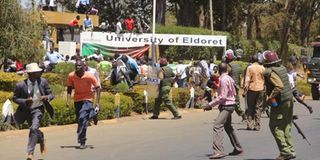University of Eldoret staffing row takes ethnic turn as leaders join fray

Police disperse demonstrators at the entrance to University of Eldoret on February 12, 2015. The rioters were led by Uasin Gishu Senator Isaac Melly. PHOTO | JARED NYATAYA |
What you need to know:
- MPs from Elgeyo-Marakwet, Uasin Gishu and Nandi counties keen to have the matters sorted out.
Promotion and appointment of academic staff at the University of Eldoret is the cause of riots that have hit the institution for the past week, leading to its indefinite closure.
A number of lecturers, including those from the local Kalenjin community, have sought the help of politicians, a local youth group and university student leaders to push for their promotion.
The lecturers are unhappy with the outcome of interviews for promotions conducted on December 15 to 17 last year, which left most of them out.
Last year, the Commission for University Education developed the criteria for appointment and promotion of university staff that was launched by Education Cabinet Secretary Jacob Kaimenyi in October.
Uasin Gishu Senator Isaac Melly, several Members of County Assembly, and Uasin Gishu Independent Youth Organisation have been unhappy with the process, which they termed unfair, leading to several demonstrations.
During the mayhem, villagers joined the rioters and stormed the university to eject Vice-Chancellor Teresa Akenga.
Students from other ethnic communities were also targeted.
During the 2007/2008 post-election violence, non-Kalenjin lecturers relocated after locals turned against them and destroyed their properties.
WAKE-UP CALL
The latest development poses a challenge to those who remained and serves as a wake-up call to the government to deal with negative ethnicity in institutions of higher learning.
The vice-chancellor has defended the exercise, saying it was conducted by the university council.
She said the disputed process involved interviews and reviews of 12 associate professors, out of 23 applications, and seven professors out of 10 applications.
The university council is chaired by Prof Sarone ole Sena and members include Peter Njeru and Daniel Mutua, a representative of the Cabinet Secretary for National Treasury.
Other members include Archer Arina, a representative of the Education Principal Secretary, Dr Musangi Mutua, Donald Kimutai, Mrs Alice Mayaka and Prof Korwa Adar.
“The candidates were subjected to rigorous shortlisting, in accordance with the criteria set out in the university’s academic staff appointment and promotion policy,” explained the Vice-Chancellor.
She added that in the shortlisting process, three applicants for the position of professor and 11 applicants for the position of associate professors were disqualified because they did not meet the minimum requirements.
She said the interviews conducted in December were not to appoint new staff but were a review and promotion exercise for existing staff inherited from Moi University’s Chepkoilel campus after it was upgraded to a university in 2013.
“The exercise was transparent and in accordance with university procedure,” said Prof Akenga.
The group’s leadership admitted that the concerns of some lecturers from the local community were the main reason for the protest.
Chairman Bob Yator said they were opposed to botched interviews and instead wanted more local lecturers promoted.
“About 19 lecturers wanted to be professors but only a few from our community were selected while the rest came from other tribes… after the threshold was raised to lock them out,” said Mr Yator.
University of Eldoret student union chairman Brain Rono said the promotions were biased towards lecturers outside the community.
'SHOULD NOT BE SUBJECTIVE'
The Commission for University Education on Saturday said it would quash any promotion in universities across Kenya that have not been carried out according to the laid-down procedures.
Chief executive officer David Some said several universities have five years to ensure all their lecturers have doctorate degrees.
He added that to be promoted, a candidate must produce their published work, teaching experience, administrative work and community engagement.
“The exercise should not be subjective. You are either qualified to be promoted or not,” said the chief executive officer.
Universities Academic Staff Union (UASU) organising secretary Musalia Edebe said any concern about university management should be expressed through the right channels.
He said attempts to bring tribalism to universities would compromise the quality of education. “We are asking politicians to keep away from university management in Kenya,” he said.
Prof Kaimenyi said Kenyans had a right to work anywhere in the country, and he would not allow university management to be determined at village level.
Prof Akenga said the university inherited over 352 casual employees from Moi University, adding that requests for enhanced budgetary allocation from the government to convert the workers to permanent and pensionable terms had not been granted.
She said the university requires about Sh164 million above its normal annual wage bill to be able to absorb the casuals.
Meanwhile, MPs from Elgeyo-Marakwet, Uasin Gishu and Nandi counties are reported to be keen to have the matters sorted out amicably.
Speaking after a meeting attended by some of them in Nairobi last week, Ainabkoi MP Samuel Chepkong’a said they did not support the violence at the university over allegations of bad administration.
And on Saturday, Nandi County Senator Stephen Sang, a close ally of Deputy President William Ruto, joined the debate and said the VC should be accountable, adding it was not a witch hunt.
Statistics from the university indicate that 77.26 per cent of the workforce is from the Rift Valley, 13.64 per cent from Nyanza, 4.55 per cent from Western and 4.55 per cent from Eastern.
Additional reporting by Copperfield Lagat





